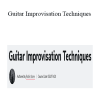Robin Stone – Guitar Improvisation Techniques
$1,250.00 Original price was: $1,250.00.$250.00Current price is: $250.00.
Digital Download: You will receive a download link via your order email after successful payment.
Many guitarists learn to solo by co-opting the technical licks and riffs from their favorite players into their own playing, while adding in their own personal feel and emotion.
Guitar Improvisation Techniques
Many guitarists learn to solo by co-opting the technical licks and riffs from their favorite players into their own playing, while adding in their own personal feel and emotion. The result of this approach is that guitarists end up knowing how to improvise in a particular style, but lack the technical understanding of why these solos work. Guitar Improvisation Techniques is designed to help guitarists who may have learned the technical aspects of playing, but lack the theoretical application of the musical elements that make up a strong solo. Through video, audio, diagrams, and discussions, the course explores the technical aspects of what makes a successful solo – from scales and arpeggios and new ways to practice them, to applying them to an improvisational context.
You will learn how to identify various modal progressions and their characteristics, and how to play and think within a diatonic framework as a means of organizing your musical vocabulary. You will listen to solos from artists such as David Gilmour (Pink Floyd), Pete Townsend (The Who), Joe Walsh (The Eagles), Robby Krieger (The Doors), Duane Allman (The Allman Brothers), Keith Richards (The Rolling Stones), Steve Clark (Def Leppard), Stevie Ray Vaughn, Eric Clapton, and John Mayer, identify the techniques in the solos that make them effective, and learn how to apply those concepts to your own playing. The course also explores tone, phrasing, theme, variation and other improvisational techniques. The goal of the course is to better equip you with a harmonic understanding of the elements of a solo that you can then implement into your own playing regardless of style.
By the end of the course, you will be able to:
- Improvise using pentatonic scales, arpeggios, and modes over various types of chords and chord progressions
- Construct solos more logically and methodically
- Develop your own unique style of improvisation
- Have a better understanding of chord scale relationships
Syllabus
Lesson 1 The Pentatonic Scale
Lesson 2 Basic Concepts for Improvising with Pentatonic Scales
Lesson 3 Pentatonic Scales of a Different Color
Lesson 4 How to Improvise over Blues Progressions
Lesson 5 Major Scales and Their Modes
Lesson 6 The Major Modes: Ionian and Aeolian
Lesson 7 The Lydian and Dorian Modes
Lesson 8 The Mixolydian and Phrygian Modes
Lesson 9 Triads and Triad Arpeggios
Lesson 10 Seventh Chord Arpeggios
Lesson 11 Tensions and Upper Structure Arpeggios
Lesson 12 Putting It All TogetherRequirements
Prerequisites and Course-Specific Requirements
Completion of Guitar Chords 201: Chord Melody and Inversions or equivalent knowledge and experience is required. Students should have:
- Basic playing experience and an understanding of pentatonic scales, major scales/modes, triads, and seventh chords
- Basic music theory knowledge, which is also helpful but not essential
Required Textbook(s)
- None required
Students are required to record video for assignments. You can use your smartphone, digital camera, or webcam to do this. If you do not already have a preferred video software, you can use the built-in recorder tool within your assignment post. You can play the backing track through your speakers as you record and the microphone will pick up both the guitar (acoustic or through an amp) and the track as you play along.
Hardware Requirements
- Electric or acoustic guitar. Check out Reverb for guitar deals*
- A built-in microphone or an external microphone plugged directly into your computer (via built-in ports or an external audio interface)
- A printer is recommended, so that you can print out music examples used in the course
General Course Requirements
Below are the minimum requirements to access the course environment and participate in live chats. Please make sure to also check the Prerequisites and Course-Specific Requirements section above, and ensure your computer meets or exceeds the minimum system requirements for all software needed for your course.
Mac Users
- OS X 10.10 Yosemite or higher
PC Users
- Windows 7 or higher
All Users
- Latest version of Google Chrome
- Zoom meeting software (available in the course when joining your first chat)
- Webcam
- Speakers or headphones
- External or internal Microphone
- Broadband Internet connection
Instructors
Author & Instructor
Robin Stone is a professor in the Guitar department at Berklee College of Music. While she teaches many styles of music, she concentrates on the history and playing styles of classic rock guitarists, including Jimi Hendrix, Jimmy Page, and the Allman Brothers. She has taught at Berklee since 1990, when she became the second woman ever hired in the Guitar department.
Stone is the managing editor and web designer of the Guitar department’s online newsletter, “Open Position,” which showcases the many talents of the faculty and provides an insider’s look into the work being done in the school’s largest department. She contributes articles under the title “String Theory,” exploring harmonic concepts for guitarists. In 1993, she composed a piece entitled “Adagio for Oboe and String Orchestra,” which was released on the MMC label. In 1996, she was awarded the Japan Foundation’s Uchida Fellowship, allowing her to live in Roppongi, Tokyo, to study the traditional Japanese instrument, the Koto.
Stone received her bachelor’s degree in professional music from Berklee in 1983. In 1988, she received her master’s degree in jazz studies from New England Conservatory, where she studied composition with William Thomas McKinley and George Russell.
Stone graduated from NEC with academic honors and became a member of Phi Kappa Lambda musical honors society.
What’s Next?
When taken for credit, Guitar Improvisation Techniques can be applied towards these associated programs:
Associated Certificate Programs
- General Music Studies Professional Certificate
- General Music Studies Advanced Professional Certificate
- Guitar Advanced Professional Certificate
Associated Degree Major
- Bachelor’s Degree in Guitar
Get Download Robin Stone – Guitar Improvisation Techniques at IMC.sale today!
Delivery Method
– After your purchase, you’ll see a View your orders link which goes to the Downloads page. Here, you can download all the files associated with your order.
– Downloads are available once your payment is confirmed, we’ll also send you a download notification email separate from any transaction notification emails you receive from IMC.sale.
– Since it is a digital copy, our suggestion is to download and save it to your hard drive. In case the link is broken for any reason, please contact us and we will resend the new download link.
– If you cannot find the download link, please don’t worry about that. We will update and notify you as soon as possible at 8:00 AM – 8:00 PM (UTC+8).
Thank You For Shopping With Us!





8 reviews for Robin Stone – Guitar Improvisation Techniques
There are no reviews yet.